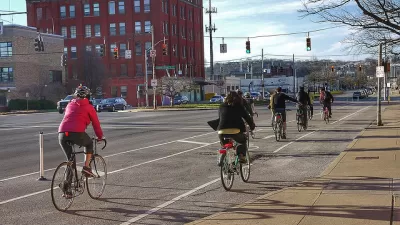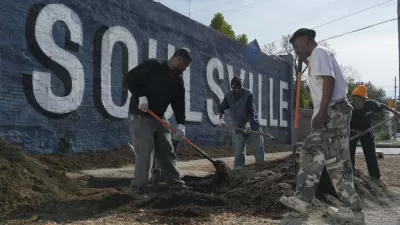Alexandra Lange argues why she thinks the model for crowdfunding made popular by the Kickstarter website "is not a suitable funding platform for a city."
As Kickstarter expands to urban interventions, Lange expresses her pessimism about its ability to fund "urbanism" rather than "gizmos." "The timeline for urban projects, the real-life approvals and the massive construction costs, are ill-suited for the Kickstarter approach. All the format can handle is a little, gizmo-like piece of the puzzle."
Lange concludes that, "If you want to fund urbanism on Kickstarter, think small. For the big picture, a park, a pool or a playing field, maybe a new social media platform will emerge, ready to walk you through the meetings and legislative hiccups, with fundraising for photocopying as well as fiber-optics."
Does that platform already exist somewhere beneath Lange's radar? Nate Berg is optimistic that it does. In response to Lange, he looks at websites such as Spacehive in the UK, and ioby in the US, that seek to export the Kickstarter crowdfunding model to attempts to improve the physical environment. "While neither of these websites might be the optimal way of building support and funding for urban projects, they each offer unique approaches that make the idea of a 'Kickstarter urbanism' a real possibility."
FULL STORY: Against Kickstarter Urbanism

Planetizen Federal Action Tracker
A weekly monitor of how Trump’s orders and actions are impacting planners and planning in America.

Chicago’s Ghost Rails
Just beneath the surface of the modern city lie the remnants of its expansive early 20th-century streetcar system.

San Antonio and Austin are Fusing Into one Massive Megaregion
The region spanning the two central Texas cities is growing fast, posing challenges for local infrastructure and water supplies.

Since Zion's Shuttles Went Electric “The Smog is Gone”
Visitors to Zion National Park can enjoy the canyon via the nation’s first fully electric park shuttle system.

Trump Distributing DOT Safety Funds at 1/10 Rate of Biden
Funds for Safe Streets and other transportation safety and equity programs are being held up by administrative reviews and conflicts with the Trump administration’s priorities.

German Cities Subsidize Taxis for Women Amid Wave of Violence
Free or low-cost taxi rides can help women navigate cities more safely, but critics say the programs don't address the root causes of violence against women.
Urban Design for Planners 1: Software Tools
This six-course series explores essential urban design concepts using open source software and equips planners with the tools they need to participate fully in the urban design process.
Planning for Universal Design
Learn the tools for implementing Universal Design in planning regulations.
planning NEXT
Appalachian Highlands Housing Partners
Mpact (founded as Rail~Volution)
City of Camden Redevelopment Agency
City of Astoria
City of Portland
City of Laramie




























